So, it turns out that today is the 218th anniversary of the signing of the United States Constitution. In honor of this formal declaration of intent to impose a centralized government over the people of the Americas, some gang of jerks in Washington have decided to declare today Constitution Day
, and to celebrate the occasion with the following charming Spontaneous Demonstration:
Americans around the world will unite on Friday, September 16,
2005, in the simultaneous recitation of the Preamble to the United
States Constitution. General Tommy Franks will lead the Preamble
which has previously been led by President George Bush Sr., U.S.
Supreme Court Associate Justice Anthony Kennedy, Chief Justice of
Alabama Roy Moore, and Pennsylvania Governor Edward Rendell. The
celebration will begin at 11 AM Pacific/12 PM Mountain/1 PM
Central/2 PM Eastern time.
Hawaii television and radio stations are urged to do a simultaneous
broadcast and to reflect and discuss the significance of the
Preamble. Newspapers are also urged to promote Constitution Day and
to print the Preamble on September 16, 2005, and on September 17,
2005.
President George W. Bush signed a bill on December 8th, 2004
(public law 108-447) which designated every September 17th as
Constitution Day.
— Hawaii Reporter 2005-09-15: Celebrating Constitution Day — September 17, 2005
Incidentally, thanks to Senator Robert Byrd, students and teachers in government-run schools will be forced to participate in this joyous nation-wide celebration of the federal government.
Therefore, the Ministry of Culture of this secessionist republic of one calls upon all sovereign individuals to celebrate International Ignore the Constitution Day on September 17th.
The Constitution, in its origins, was an act of naked usurpation: the imposition of a government on millions of sovereign individuals and all of their descendents. Many of those who were asked did not consent to it, and the vast majority of the population of the Americas at the time (who were by turns unpropertied, Black, Indian, and/or female) never were asked whether they wanted it or not. Certainly you have not, 218 years on, and neither do I. If I got together with a group of my buddies at the coffee-shop, wrote We are your Grand High Poo-bahs, and you must do as we say
on a napkin, signed it at the bottom, and then (just to be sure you understood) scrawled This is a Constitution for the United States
across the top, you would consider me a lunatic if I went around insisting that the napkin I was holding obligated you to do as I say. Yet in what relevant respect are the obligations
imposed on us by the U. S. Constitution any different? Did a self-selected gang of ambitious delegates somehow gain the prerogative to impose a novel, centralized, invasive government on other people against their will–the same prerogative you would think I was crazy for asserting? If so, how did they get it? If they had some kind of right, under natural law, to impose a new order of government when they saw fit, then why don’t I have the authority to do the same, for myself, whenever I decide I don’t like what they set up? (Is it because they wore powdered wigs?) If neither they nor I have the right, under natural law, to impose a new order of government, then why do their written commands have any authority than the orders of a mafioso (which may be quite consistently enforced, but which few would consider themselves morally bound to obey)? If they did have the right to do so but only with the consent of the governed, then what obligation has the Constitution ever had over those who voted against ratification, or those who never were asked for their consent? (Which, today, means everybody.)
You might say that, however dubious the notion of the consent of the governed may be, in connection with the authority of the Constitution, still, the Constitution was a wise act of statecraft and it would be wise for us to go along with it no matter how much the moralists might scowl. But is it? Hardly. The Constitution today is read, by the powers that be, to authorize the monster State that today senselessly lies and murders tens or hundreds of thousands of people around the world, pushes starvation Drug War policies and murderous patent monopolies (the latter under the mantle of Free Trade
!) at home and throughout the Third World, that now continually threatens women’s basic human rights over their own bodies, and much more — and, by the way, steals trillions of your hard-earned dollars to do it all. The highest legal authorities have ruled (and thus, made it the effective policy of the State) that the Constitution authorizes federal policies such as military tribunals, the military draft, and Japanese internment. Either the Constitution does authorize these abominations and more (in which case it is the handbook for a monster State) or else it failed to prevent them (in which case it is utterly useless even for its stated purpose of securing the blessings of liberty). In either case, it ought morally to be treated like a dead letter.
You might say, O.K., fine. I realize that the current federal government isn’t much to cheer for. But isn’t Constitution Day all about celebrating how it was in its origins?
But that move will certainly not get you any further. In its origins the Constitution was a pro-slavery document, which authorized (indeed, demanded) federal laws for the capture and re-enslavement of fugitive slaves; it protected Southern slavery also by authorizing the the use of the federal military against slave uprisings — supporting Southern slavery with Northern bayonets. The Northern whites compromised with the Southern slave power: support for an invasive central State in return for the protection that such a central State could offer for slavery. It was, as William Lloyd Garrison declared it, a covenant with Death and an agreement with Hell
, and he knew how to celebrate its achievements:

The [4th of July 1851] rally began with a prayer and a hymn. Then Garrison launched
into one of the most controversial performances of his career.
To-day, we are called to celebrate the seventy-eighth
anniversary of American Independence. In what spirit?
he asked,
with what purpose? to what end?
The Declaration of
Independence had declared that all men are created equal … It is
not a declaration of equality of property, bodily strength or
beauty, intellectually or moral development, industrial or
inventive powers, but equality of RIGHTS–not of one race, but of
all races.
—Massachussets Historical Society, July 2005
We have proved
recreant to our own faith, false to our own standard, treacherous
to the trust committed to our hands; so that, instead of helping to
extend the blessings of freedom, we have mightily served the cause
of tyranny throughout the world.
Garrison then spoke about the
prospects for the success of the revolutionary spirit within the
nation, prospects he regarded as dismal because of the insatiable
greed, boundless rapacity, and profligate disregard of justice
prevalent at the time. He concluded his speech by asserting,
Such is our condition, such are our prospects, as a people, on
the 4th of July, 1854!
Setting aside his manuscript, he told
the assembly that he should now proceed to perform an action
which would be the testimony of his own soul to all present, of the
estimation in which he held the pro-slavery laws and deeds of the
nation
…
— from Thoreau: Lecture 43, 4 July, 1854
Producing a copy of the Fugitive Slave Law, he set fire to it,
and it burst to ashes. Using an old and well-known phrase, he
said, And let all the people say, Amen
; and a unanimous
cheer and shout of Amen
burst from the vast audience. In
like manner, Mr. Garrison burned the decision of Edward G. Loring
in the case of Anthony Burns, and the late
charge of Judge Benjamin R. Curtis to the United States Grand Jury
in reference to the treasonable
assault upon the Court
House for the rescue of the fugitive–the multitude ratifying the
fiery immolation with shouts of applause.
Then holding up the U.S. Constitution, he branded it as the source and parent of all the other atrocities,–“a covenant with death, and an agreement with hell,”–and consumed it to ashes on
the spot, exclaiming, So perish all compromises with tyranny!
And let all the people say, Amen!
A tremendous shout of
Amen!
went up to heaven in ratification of the deed,
mingled with a few hisses and wrathful exclamations from some who
were evidently in a rowdyish state of mind, but who were at once
cowed by the popular feeling.
–from The Liberator, 7 July 1854 (boldface added)
You, too, can celebrate Ignore the Constitution Day
! Today, completely ignore all claims to authority granted in the Constitution. Live your life as if the Constitution had no more claim on you than the decrees of Emperor Norton. Enjoy your rights under natural law; you have them whether or not the Constitution says one mumbling word for them. While you’re at it, treat the Constitution as completely irrelevant in political arguments too; instead of complaining that unbridled war powers for the President are unconstitutional, for example, complain that they are evil; instead of reciting that damn Davy Crocket bed-time story again and complaining that government-controlled disaster relief is unconstitutional, complain that government-controlled disaster relief is foolish and deadly. (If the Constitution clearly authorized unilateral war powers for the President, or abusive and incompetant government-controlled disaster relief, would that make it okay?) And, hell, while you’re at it, quit complaining that forced Constitution Day celebrations may be unconstitutional; complain instead that they force children to participate in cultish praise for the written record of a naked usurpation.
Just go ahead. Ignore the Constitution for a day. See what happens. Who’s it gonna hurt? And if your political reasoning becomes sharper, your discourse no longer bogs down in a bunch of pseudo-legal mummeries, and you have a pleasant day without having to ask anybody’s permission for it, then I suggest you continue the celebration, tomorrow, and every day thereafter.
Further reading
Other national holidays:

